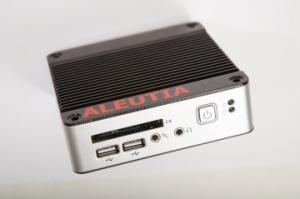 User with green PC Non-profit internet provider GreenNet has recently released a new ultra-low power computer. The tiny computer can run on a car battery for hours and uses a maximum of nine watts of electricity. Sustainable in almost every way – from its fabrication, to its distribution and consumption – the E2 also comes fully equipped with free and open source operating systems. APCNews interviewed Sharif Fanselow of GreenNet to find out more about this revolutionary computer.
User with green PC Non-profit internet provider GreenNet has recently released a new ultra-low power computer. The tiny computer can run on a car battery for hours and uses a maximum of nine watts of electricity. Sustainable in almost every way – from its fabrication, to its distribution and consumption – the E2 also comes fully equipped with free and open source operating systems. APCNews interviewed Sharif Fanselow of GreenNet to find out more about this revolutionary computer.
GreenNet is a not-for-profit, ethical collective internet service provider. Geared towards the needs of civil society organisations, GreenNet came to existence in the late 80s to support networking efforts within the green movement initially. As one of the founding members of APC, GreenNet’s current work focuses on supporting organisations that promote peace, human rights and the environment through the use of ICTs. GreenNet has now joined forces with Aleutia, a producer and distributor of affordable computers worldwide that specializes in distributing affordable computers in the developing world and Africa.
APCNews: What’s so exciting about GreenNet and the E2?
SF: GreenNet has been following Aleutia closely over the last year and felt that the progress being made in the low power “green pc” market was remarkable. To think we could operate computers doing day to day tasks like web browsing, word processing or spreadsheets, using a fraction of the power consumption immediately made us think of how it could be implemented here in the UK, as well as in Africa, South America and Asia specifically areas where a reliable source of power is rare.
APCNews: Tell us a bit about your relationship with Aleutia
SF: We are primarily distributors of some Aleutia products (primarily low power computing, solar panels, power packs, etc.) and offer pre-sales support as well as tailor-made solutions for NGOs.
We’ve been offering the E2 for a couple of months now and have had a lot of interest and a few purchases without doing much advertising or marketing. The uses vary from home users, or people who don’t need a huge amount of processing power and want a pleasantly silent PC to do general day-to-day work, to charity fundraisers on a journey from London to Kazakhstan who need a rugged PC for the journey to act as a reliable GPS unit, and even for a little entertainment.
Aleutia’s main market is Africa, where many of GreenNet’s members have active projects. The GreenNet/Aleutia team offers NGOs and charities a specialised team that understands their requiremets. GreenNet provides an expert IT team that can mock up draft setups for the E2, or the E3, or the Small Green PC that can be based in a UK office or rural internet cafe in Sierra Leone.
The E3 is the same size and has the same appearance as the E2, but has a faster processor (1.5GHz) and a few other tweaks to make it a system that can deal with more demanding computing tasks. We’ll be offering the E3 sometime before Christmas.
Other than product development, we work together in tailoring the best possible setup for remote internet cafe’s. For example we had an enquiry from someone who was looking to donate a remote internet setup to a school in Sierra Leone. He wanted a cheap solution to share a 512Mbps connection between 10-20 computers in a school, and then use mesh networking technology to further the signal in a part of the world where a little bandwidth like that can cost you upwards of $200 per month! We’re working on drawing up plans including solar panels to power the machines to implement his vision and hopefully bring a wealth of information to this remote area. Green PC
Green PC
APCNews: Wow, that sounds interesting! So, if someone lives overseas, say in Africa, can they buy the E2 from you without problems?
SF: Absolutely; there are no problems in sending to Africa. Because all the shipping is dealt with centrally through Aleutia’s current distribution network, it is easy and cheap to send anywhere. Aleutia has customers in over 30 countries worldwide. It costs around 30 pounds (about $ 50 USD) to send an E2 to Africa.
APCNews: What are the plans for distribution outside the UK, especially in less developed countries?
SF: Resellers based in Africa can be found on Aleutia’s site, however their involvement with Aleutia is different from that with GreenNet. They work mainly with companies, the government and schools. GreenNet’s relationship with Aleutia aims to offer NGOs and charities, as well as individual activists more than just a reseller relationship, but a friendly organisation that knows a bit more than just IT, and that is passionate about the causes our members are fighting for.
Find out more about the E2
Photos courtesy of Aleutia